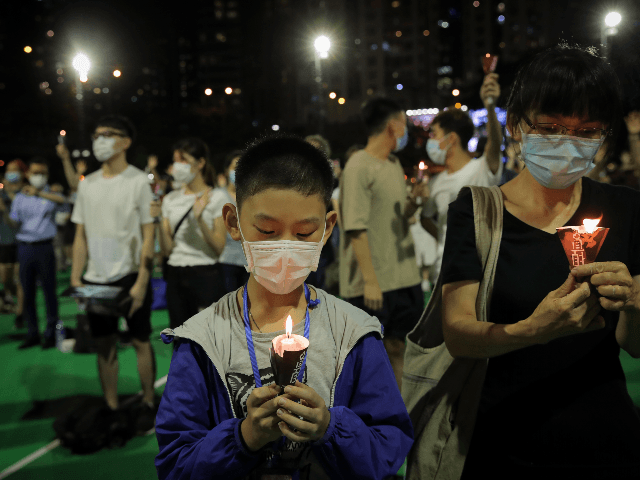Thousands of Hong Kong residents flooded city squares throughout the region to observe the 31st anniversary of the Tiananmen Square massacre on Thursday, despite pro-China authorities banning assemblies in honor of the event.
The massacre occurred in Beijing in 1989, resulting in what experts believe were thousands of deaths at the hands of the communist People’s Liberation Army. Every year since 1990, Hong Kong residents fill the city’s Victoria Park to honor the dead with a candlelight vigil, typically attracting thousands of people.
This year was the first time in history that Hong Kong police rejected a permit request for the vigil, which has no history of violence or conflict. Hong Kong authorities have banned gatherings in public of over eight people in response to the Chinese coronavirus and claimed that the event was too “high-risk” for the spread of infectious disease.
Thursday began with students at the University of Hong Kong partaking at a smaller, legal event in honor of the dead pro-democracy protesters: the washing of a statue known as the Pillar of Shame, created in homage of those the Chinese Communist Party killed. According to the Hong Kong Free Press (HKFP), students engaged in an annual washing ceremony, similar to the cleansing of the tombs of loved ones, on June 4. Police did not intervene during this event.
Later in the day, the Alliance in Support of Patriotic Democratic Movements of China – a group founded shortly before the massacre in 1989 that typically files for a permit for the Hong Kong candlelight vigil every year, set up outside of Victoria Park, the traditional venue, and began handing out candles. The distribution occurred in the evening, also without police interruption, although police had set up barricades to prevent people from going into the center of the park, where the vigil typically occurs. Attendees breached the barricades.
“Sources had earlier indicated that officers will not interfere if people in small groups go to the park, as long as they don’t breach an eight-person limit on public gatherings,” the broadcaster RTHK reported.
Reports began surfaced on Thursday evening that those who arrived at Victoria Park numbered in the thousands. Images showed large crowds of people in the vast soccer fields in the center of the park, but with significant gaps between them, indicating that many were attempting to keep to social distancing guidelines.
The HKFP noted that the Alliance in Support of Patriotic Democratic Movements of China ensured that people entered the open space eight at a time, abiding by pandemic protocols.
“Alliance chairman Lee Cheuk-yan led chants for the authorities to vindicate the 1989 pro-democracy movement, and to oppose a planned national security law being drawn up by Beijing to be imposed on Hong Kong,” RTHK reported. The Chinese National People’s Congress passed a law last week that allows the Communist Party to prosecute anyone in Hong Kong for a variety of “national security” crimes, including “secession” and “foreign interference,” which Hong Kong protesters fear will be used to silence them.
Among the chants RTHK detailed were “end to one-party rule!” and “democracy in China now!”
“A small crowd of around a hundred people gradually grew into the thousands, with two football pitches almost filled up before 8 p.m., while large crowds of people were still lining up for candles being handed out outside the park,” RTHK reported.
Outside of Victoria Park, crowds gathered in their respective neighborhoods with candles, forming smaller patches of anti-China resistance. Among the neighborhoods participating were Sai Ying Pun, Tsim Sha Tsui, Yuen Long, and Mong Kok – prominent areas throughout the past year for pro-democracy protests. In the smaller vigils, some mixed messages of remembrance for the victims of the Tiananmen massacre with slogans associated with the Hong Kong protest movement, such as “five key demands, not one less.”
Protesters last year demanded freedom for political prisoners, an end to calling their protests “riots,” universal suffrage, an independent investigation into police brutality, and the withdrawal of a proposed bill that would have allowed extradition of anyone in Hong Kong to the Chinese prison system. The Hong Kong government only ceded on the final point, but the new “national security law” passed by Beijing effectively has the same impact as the one proposed in Hong Kong’s legislature.
Many of the slogans used in the vigil could potentially result in criminal charges under the new “national security” law.
“We call upon the people of Hong Kong to light a candle with us next year on June 4, and we will continue… we will fight on, and we will let the world know we Hong Kong people will not give up our freedom”, Lee, the Alliance chairman, said at the Victoria Park event. “This is an international front for Hong Kong to show to the world that though China is totally dark and brain-washing their own people; in Hong Kong, we still will light our candles for those who sacrificed [their lives] back in the ’89 democracy movement.”
At press time, police appear to have only taken action in Mong Kok, where reports indicate the used pepper spray to assault vigil attendees. The triggering event reportedly was an attempt by attendees at the vigil to block a major road in the area, which resulted in a swift police response to clear the beginnings of makeshift barricades.
Police issued a statement on Twitter on the Mong Kok situation confirming “several” arrests and asserting, “if protestors [sic] hadn’t blocked roads, police wouldn’t have intervened.”

COMMENTS
Please let us know if you're having issues with commenting.